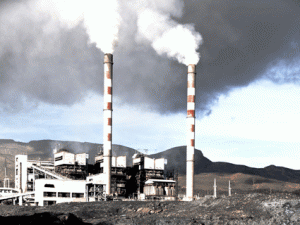Clean Coal
 After WWII, a lot of research was done examining propaganda techniques. The impetus was how Nazi propaganda was used to control the German people. A major technique is The Big Lie: take an obvious falsehood, such as the international Jewish Conspiracy, and repeat it so often that the citizens start believing in it.
After WWII, a lot of research was done examining propaganda techniques. The impetus was how Nazi propaganda was used to control the German people. A major technique is The Big Lie: take an obvious falsehood, such as the international Jewish Conspiracy, and repeat it so often that the citizens start believing in it.A current Big Lie here is Clean Coal. Take a look at a coal train, coal mine, or coal fired power plant and you can see that coal is not clean. Yes, coal is somewhat cleaner than in past years, but the evidence is overwhelming that coal is our dirtiest energy source.
I am from Western Colorado, and my father liked to tell stories about the coal smoke cloud over Grand Junction in the days when coal was used to heat most houses and businesses.
In Colorado, most power plants have converted from coal to cleaner natural gas. In other areas of the country, however, natural gas supplies are tighter and gas costs more than coal. Things have not slowed down much in Wyoming’s Powder River Basin coal mines. I live close to the rail lines that pass through Denver. At any time of the day, there are several coal trains stopped waiting in line to go over the grade that is Monument Hill. Those trains are headed to Texas and other southern states
On February 10, I see a news story that the CEO of the company that spilled that coal-washing chemical in West Virginia ducked a hearing on the spill, this after they filed bankruptcy to avoid responsibility for the mess. In West Virginia, coal is king, regardless of the consequences. Hundreds of thousands had their drinking water made unusable for weeks.
Since the middle of the nineteenth century, there has been an ongoing battle between corporate profit-driven industries and their actions; and those who are harmed by those actions. People harmed have turned to government for help, and the political response has made news since the first runaway horse and wagon killed someone. Many businesses are responsible, and try their best to do no harm while making a profit. Many other businesses, however, see profit as the goal that overrides any other concern.
Here in Colorado, the Ludlow Massacre, the most violent labor dispute in U. S. History grew out of the conditions workers were forced to endure in the Southern Colorado coal fields. Poor pay, long hours, constant danger, and poor living conditions prevailed throughout the industry and led to a series of violent strikes in all the coal-bearing regions of the state that climaxed in Ludlow in 1914. The governor called out the state militia to support the company owners against the strikers. The militia attacked the makeshift tent camp the miners had built, burned it, and killed about 115 women and children. The violence did not end.
Violence was done to the people by a combination of government and mine owners in Southern Colorado, and violence is being done to the people of West Virginia by a chemical company, part of the coal industry; and weak government regulation. The real violence is being done to us all from the pollutants going into the air and water.
In the short run, natural gas is less damaging than coal, but the real need is to make the switch to renewable energy. President Carter proposed a move to renewables early in his administration, even putting solar panels on the roof of the White House. President Reagan removed the panels, cut the National Renewal Energy Laboratory by 90 percent, and the country moved backwards, accelerating the rise in global temperature and presenting us with the crisis we now face.
The U.S. Foot dragging in energy policy combined with the rapidly growing fossil energy consumption in China and India, is generating a global crisis that will only get worse before it gets better. For us, the task is to get away from coal, then all hydrocarbons.